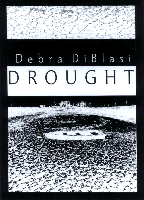 |
DEBRA DI BLASI grew up on a sprawling cattle farm in rural Missouri. Before taking a painting degree from the Kansas City Art Institute, she studied poetry and fiction at the University of Missouri-Columbia, and later at San Francisco State. After living in Europe and California, she again settled in Kansas City where she currently resides. Di Blasi's short stories have appeared in New Letters, Sou'wester, New Delta Review, Cottonwood, Colorado-North Review and other literary publications, as well as in the anthology, "Lovers: Writing By Women". She has published essays, articles and art reviews in a variety of periodicals and anthologies, and is the author of screenplays including "Drought", premiering Spring 1997, and "The Walking Wounded", a finalist at the 1996 Austin Heart of Film Screenwriters Competition. She has just completed a full-length experimental novel titled, "Reprise: Reprisal", and is collaborating with music composer and producer Wieslaw Pogorzelski on a symphonic interpretation of this novel.
 "People content to name the will's inevitable defeat `God' or `History' will not long endure these restless stories. Di Blasi writes for the rest of us, the comfortless unconfessed of us."
H.L. Hix, author of Spirits Hovering over the Ashes: Legacies of Postmodern Theory
"People content to name the will's inevitable defeat `God' or `History' will not long endure these restless stories. Di Blasi writes for the rest of us, the comfortless unconfessed of us."
H.L. Hix, author of Spirits Hovering over the Ashes: Legacies of Postmodern Theory
|
TWO EXPERIMENTAL NOVELLAS
DISSECT ISSUE OF VIOLENCE
BETWEEN LOVERS
"Drought" is the searing tragedy of a man and woman trapped in a dying
romance within a landscape devastated by drought--a brutal landscape where
nature methodically devours itself and even the righteous are pushed into
acts of desperation. This dark tale of passion moves through four months of
rainless heat toward a violent conclusion paralleled in the ravaged
countryside. Written in a style that is at once lyrical and austere,
"Drought" is a significant literary achievement by a new American writer.
Di Blasi's fiction is seasoned with visual imagery haunting in its painful
and sometimes shocking frankness. "Drought" is paired here with the equally
provocative novella, "Say What You Like". A must read for everyone
interested in the future of literature.
|
|
